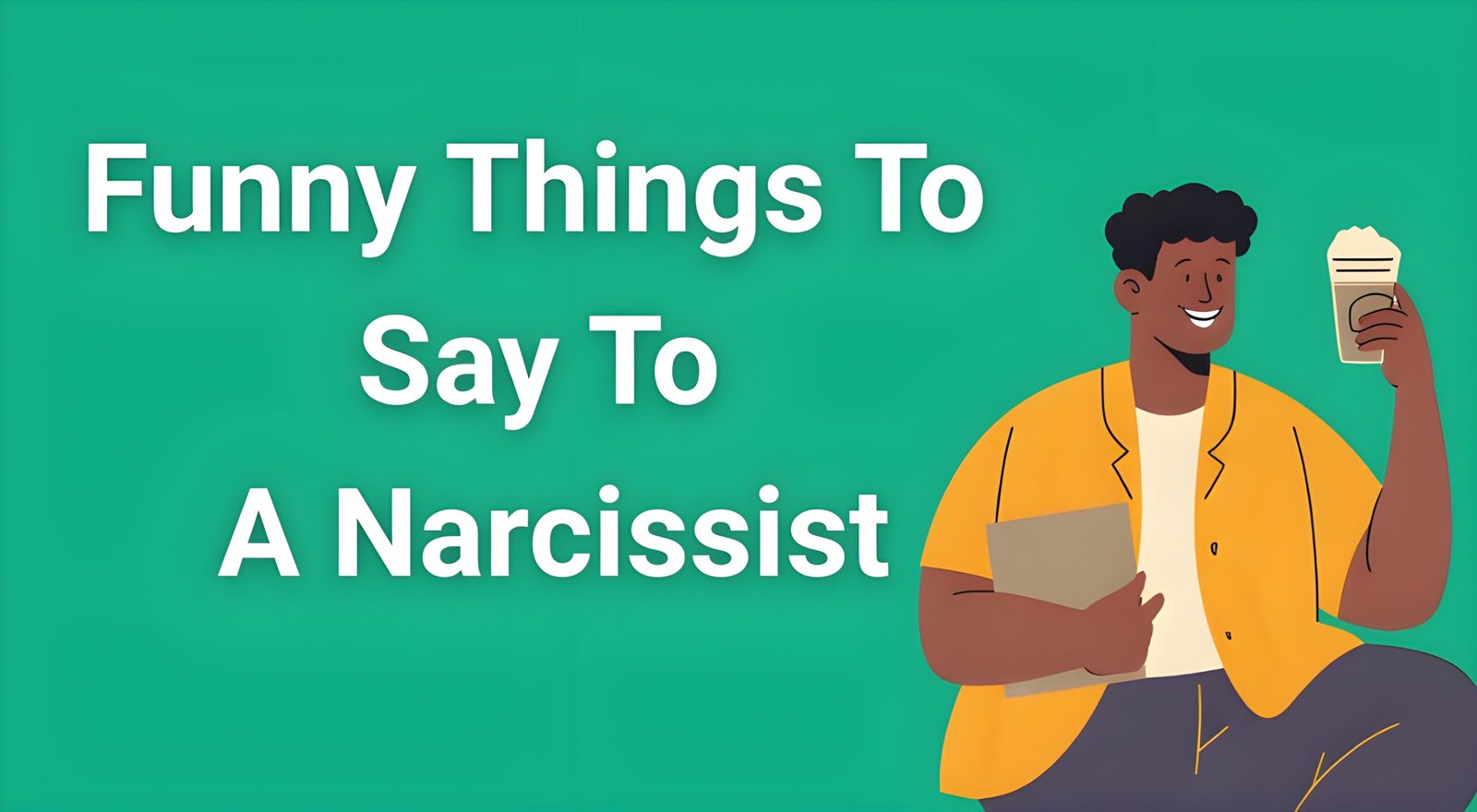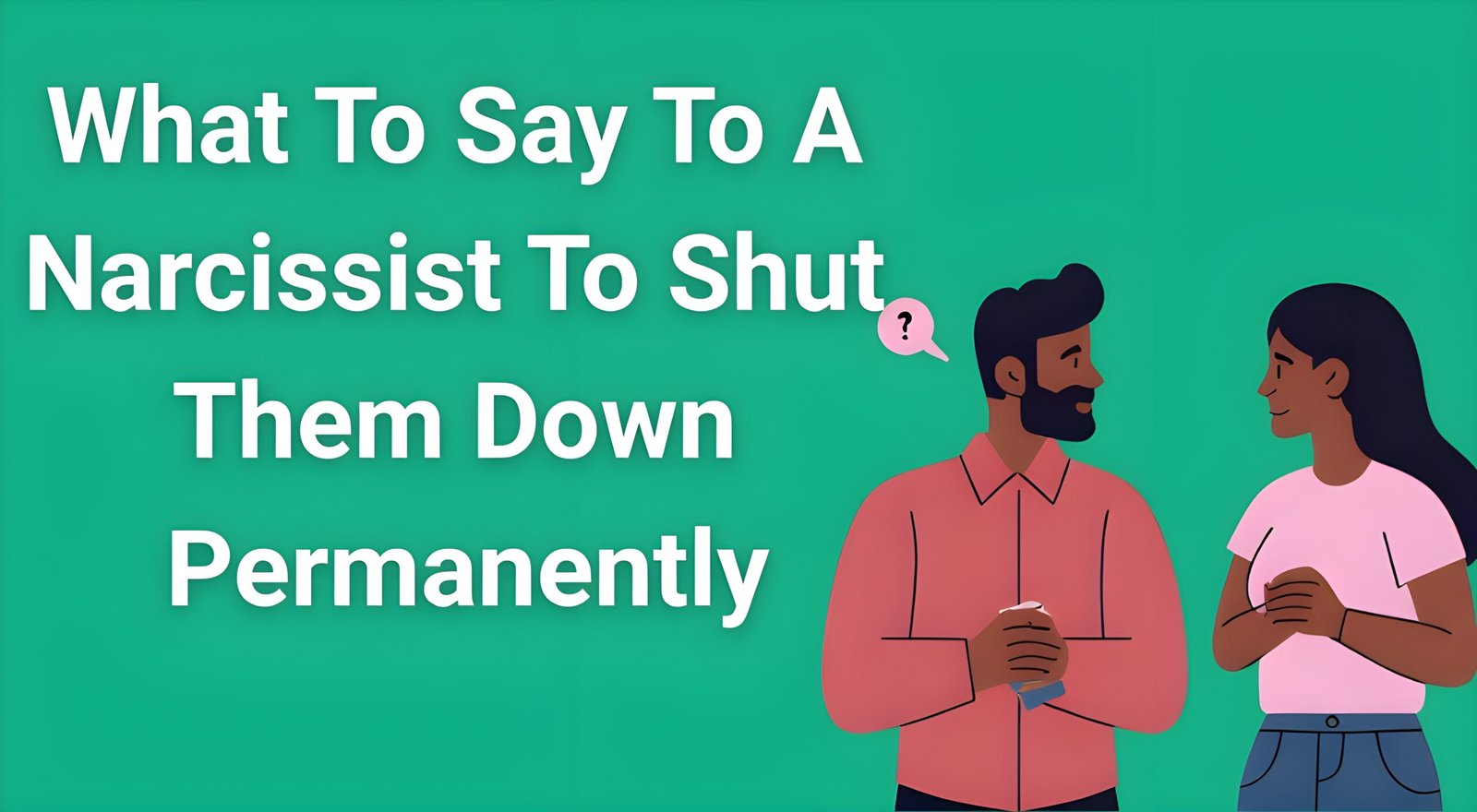Dealing with a narcissist can feel like being trapped in a psychological maze where every conversation becomes about them, your feelings don’t matter, and somehow you’re always the villain. If you’re searching for funny things to say to a narcissist, you’re likely feeling exhausted, confused, and desperate for some way to regain control in these interactions.
- Understanding the Psychology: Why Funny Things to Say to a Narcissist Can Be Effective
- CRITICAL SAFETY WARNING
- 35 Funny Things to Say to a Narcissist (Organized by Situation)
- When NOT to Use These Funny Responses
- The Psychology Behind Why These Work
- Recognizing When You Need Professional Help
- The Trauma Bond Challenge
- Building Your Confidence Arsenal
- The Gray Rock Alternative
- For Those Who Can’t Leave Yet
- Moving Beyond Comebacks to Healing
- Building Your Future Defense System
- Frequently Asked Questions
- Conclusion: Your Path Forward
The truth is, finding the right words can be both empowering and dangerous. While humor can sometimes deflate a narcissist’s inflated ego or give you momentary relief, it’s crucial to understand when and how to use these responses safely. This comprehensive guide will provide you with 35 witty comebacks, but more importantly, it’ll teach you the psychology behind why they work and when you should avoid them altogether.
Understanding the Psychology: Why Funny Things to Say to a Narcissist Can Be Effective
Before diving into specific phrases, it’s essential to understand what makes narcissists tick. People with narcissistic personality traits have an inflated sense of self-importance, desperately need admiration, and lack empathy for others. Their ego is simultaneously massive and fragile, making them surprisingly vulnerable to well-timed humor.
Funny things to say to a narcissist work because they:
- Disrupt their need for control and admiration
- Highlight the absurdity of their behavior
- Create emotional distance
- Can deflate their grandiose self-image
- Often confuse them (they struggle with irony and sarcasm)
However, these responses should only be used when you’re in a relatively safe situation and not dealing with someone who might become violent or escalate their abuse.
CRITICAL SAFETY WARNING
If you’re in an abusive relationship, living with a narcissistic parent, or dealing with someone who has shown violent tendencies, DO NOT use confrontational humor. These responses could escalate dangerous situations. Your safety is more important than getting the last word.
35 Funny Things to Say to a Narcissist (Organized by Situation)
For the Self-Absorbed Conversationalist
1. “Wow, you should write a book called ‘Me, Myself, and I’ – it would be a bestseller!”
This comment highlights their self-obsession while maintaining a seemingly complimentary tone. Narcissists often won’t immediately recognize the sarcasm.
2. “I’d agree with you, but then we’d both be wrong.”
A classic comeback that questions their “always right” mentality without being overtly aggressive.
3. “Thanks for the autobiography, but I was actually asking about the weather.”
Perfect for when they turn every simple question into a story about themselves.
4. “You must be exhausted from carrying conversations about yourself all day.”
This funny thing to say to a narcissist points out their conversational selfishness with mock concern.
5. “If I had a dollar for every time you talked about yourself, I could retire by now.”
A humorous way to highlight their narcissistic conversation patterns.
For the Grandiose Know-It-All
6. “You should teach a masterclass on ‘Being Perfect 101.'”
This response uses exaggerated praise to highlight their arrogance.
7. “Even Einstein would feel inadequate next to you!”
The over-the-top compliment exposes their grandiose self-perception.
8. “I didn’t realize we were in the presence of greatness. Should I bow?”
This theatrical response can deflate their pompous behavior through obvious sarcasm.
9. “You don’t need Google – you know everything!”
A seemingly admiring comment that actually highlights their know-it-all attitude.
10. “Wow, another groundbreaking insight from the department of obvious!”
Perfect for their tendency to state obvious things as if they’re profound discoveries.
For the Attention-Seeking Drama Creator
11. “Should I get you a spotlight? You seem to have lost yours.”
This funny thing to say to a narcissist addresses their constant need to be the center of attention.
12. “I think Netflix should make a reality show about your life. Oh wait, they already did – it’s called ‘All About Me.'”
Highlights their tendency to make everything dramatic and about them.
13. “Are we having a conversation or am I attending your one-person show?”
Perfect for when they dominate interactions completely.
14. “I’d take a selfie with you, but there’s only room for one star in the frame.”
Addresses their need to always be the focus of attention.
15. “You should charge admission for these performances.”
Great for calling out their dramatic, attention-seeking behavior.
For the Manipulative Guilt-Tripper
16. “You should get down from that cross – we need the wood for a fire.”
One of the most effective funny things to say to a narcissist who plays the martyr role.
17. “Your victim costume looks a little wrinkled – maybe time for a new act?”
Calls out their tendency to play the victim to manipulate others.
18. “I didn’t realize we were competing in the Suffering Olympics today.”
Perfect response to their one-upping your problems with their “worse” situation.
19. “Thanks for that guilt trip – I wasn’t planning to go anywhere, but the travel brochure was compelling.”
A witty way to acknowledge and deflect their manipulation attempts.
20. “Is this the part where I’m supposed to feel sorry for you?”
Direct but humorous way to refuse their manipulation.
For the Credit-Stealing Show-Off
21. “Congratulations on taking credit for gravity – Newton would be so proud.”
Perfect for when they claim credit for things they didn’t do.
22. “You’re so humble, you only talk about your achievements 90% of the time.”
Highlights their false modesty and bragging.
23. “I love how you give yourself a standing ovation after every story.”
Addresses their need for constant self-praise.
24. “Your trophy case must be huge – you know, for all the imaginary awards.”
A humorous way to call out their exaggerated accomplishments.
25. “If boasting were an Olympic sport, you’d definitely medal.”
Another funny thing to say to a narcissist who constantly brags.
For the Boundary-Pushing Controller
26. “I didn’t realize you were promoted to manager of my life. Congratulations!”
Perfect for when they try to control your decisions.
27. “Thanks for the unsolicited advice – I’ll file it under ‘Things I Didn’t Ask For.'”
Addresses their tendency to give unwanted guidance.
28. “I appreciate your concern, but my life choices aren’t a group project.”
Clear boundary-setting with a touch of humor.
29. “Are you my life coach now? I don’t remember hiring you.”
Great for when they try to manage your decisions.
30. “I’ll take that suggestion under advisement and promptly ignore it.”
Humorous way to dismiss their controlling behavior.
Universal Funny Things to Say to a Narcissist
31. “That’s a fascinating perspective from the center of your universe.”
Works in almost any situation where they’re being self-centered.
32. “I’m impressed you could come up with that insight despite your obvious disadvantage.”
A mysteriously insulting compliment that will confuse them.
33. “You’re absolutely right – in your own special world.”
Validates them while subtly indicating they’re disconnected from reality.
34. “Listening to you is like watching a masterclass in confidence – misplaced, but impressive.”
Acknowledges their confidence while questioning its foundation.
35. “I’d explain it to you, but I left my crayons at home.”
A classic comeback for when they’re being deliberately obtuse.
When NOT to Use These Funny Responses
Understanding when to avoid using funny things to say to a narcissist is crucial for your safety and wellbeing. Never use these responses when:
- You’re financially dependent on them
- They have a history of violence or aggression
- You’re in a custody battle or legal situation
- You’re at work and they have power over your job
- You’re still living in their home
- They’re in a position of authority over you
- You suspect they might retaliate against your children
The Psychology Behind Why These Work
Funny things to say to a narcissist are effective because they exploit key vulnerabilities in narcissistic psychology:
Disruption of Supply: Narcissists feed on reactions – both positive and negative. Humor can confuse this dynamic.
Cognitive Dissonance: They struggle to process sarcasm and irony, creating mental confusion.
Ego Deflation: Well-timed humor can puncture their inflated self-image.
Loss of Control: They lose their ability to manipulate the conversation when you respond unexpectedly.
Recognizing When You Need Professional Help
Sometimes, dealing with narcissistic behavior goes beyond needing witty comebacks. If you’re questioning your sanity, feeling constantly confused, or struggling to understand what’s happening in your relationship, you might be experiencing narcissistic abuse.
Many people don’t realize they’re being systematically manipulated through techniques like gaslighting, love-bombing, and emotional manipulation. If you’re asking yourself questions like “Am I crazy?” or “Is this actually abuse?” you’re not alone.
Getting clarity about your situation can be life-changing. Professional analysis can help you understand exactly what you’re dealing with, validate your experiences, and provide a roadmap for moving forward. Sometimes the confusion lifts completely when you finally have expert insight into the manipulation tactics being used against you.
The Trauma Bond Challenge
One of the most confusing aspects of narcissistic relationships is why leaving feels impossible, even when you know the relationship is harmful. This isn’t weakness – it’s neuroscience.
Trauma bonds function like addiction in your brain. The cycle of cruelty and kindness creates neural pathways that make leaving feel literally impossible. Your brain believes you need this person to survive, even when logic tells you otherwise.
If you find yourself:
- Checking their social media obsessively
- Going back after promising yourself you wouldn’t
- Feeling physically ill when trying to stay away
- Unable to follow “just leave” advice
You’re likely dealing with trauma bonding, not a lack of willpower. Understanding this brain chemistry can be the first step toward breaking free. Specialized recovery approaches that address the neurological addiction, rather than just willpower, are often necessary for lasting change.
Building Your Confidence Arsenal
While funny things to say to a narcissist can provide temporary relief, building genuine confidence is your best long-term defense. This means:
Developing Boundary Skills: Learning to say no without explanation or justification.
Recognizing Manipulation: Understanding tactics like gaslighting, triangulation, and love-bombing.
Building Support Networks: Connecting with people who validate your reality.
Practicing Self-Care: Prioritizing your mental and physical health.
Trusting Your Instincts: Believing your perceptions and feelings matter.
The Gray Rock Alternative
Sometimes, the safest approach with a narcissist isn’t humor but the “Gray Rock Method” – making yourself as boring and uninteresting as possible. This means:
- Giving minimal responses
- Avoiding emotional reactions
- Sharing no personal information
- Becoming “uninteresting” as a target
This approach can be more effective than funny things to say to a narcissist when you need to maintain contact but want to minimize drama.
For Those Who Can’t Leave Yet
If you’re dealing with a narcissist but can’t leave your situation immediately – whether due to finances, children, family obligations, or other constraints – know that there are strategies for emotional survival while you plan your next steps.
Protecting your mental health while trapped in a narcissistic environment requires specific techniques for:
- Maintaining your sense of reality
- Protecting your emotional energy
- Planning safe exit strategies
- Documenting concerning behaviors
- Building support systems quietly
Remember, leaving isn’t always immediately possible, and that doesn’t make you weak or complicit. Sometimes survival mode is necessary while you work toward freedom.
Moving Beyond Comebacks to Healing
While knowing funny things to say to a narcissist can provide momentary empowerment, true healing requires addressing the deeper impact of these relationships. Many survivors experience:
- Difficulty trusting their own perceptions
- Chronic anxiety and depression
- Problems with future relationships
- Loss of identity and self-worth
- Complex trauma symptoms
Recovery is possible, but it often requires specialized understanding of narcissistic abuse and its effects. Generic relationship advice rarely addresses the unique psychological impact of these relationships.
Building Your Future Defense System
Once you understand narcissistic patterns, you can better protect yourself from future toxic relationships by recognizing early warning signs:
Love-Bombing: Overwhelming attention and affection early on Future-Faking: Making promises about a future together they never intend to keep Boundary Testing: Small violations to see what they can get away with Isolation Tactics: Gradually separating you from friends and family Gaslighting: Making you question your memory and perceptions
Frequently Asked Questions
Q: Is it safe to use funny comebacks with all narcissists?
A: No, absolutely not. Only use humorous responses when you’re safe and not dealing with someone who might escalate to violence or severe retaliation.
Q: Why don’t narcissists understand sarcasm well?
A: Narcissists often struggle with emotional intelligence and theory of mind, making it difficult for them to process indirect communication like sarcasm or irony.
Q: Can humor actually change a narcissist’s behavior?
A: While humor might temporarily disrupt their patterns, narcissistic personality traits are deeply ingrained and rarely change through confrontation alone.
Q: What if using these responses makes things worse?
A: If someone escalates dramatically in response to mild humor, that’s actually valuable information about their true nature and your safety. Trust those red flags.
Q: How can I tell if someone is truly narcissistic or just confident?
A: Genuine confidence doesn’t require putting others down, lacks empathy, or need constant validation. Healthy confidence can handle disagreement and criticism.
Conclusion: Your Path Forward
Learning funny things to say to a narcissist can be empowering, but remember – your goal isn’t to change them or win arguments. Your goal is to protect your own wellbeing and sanity.
These 35 responses can help you feel more prepared and confident, but they’re just tools in a larger toolkit for dealing with difficult people. The most important thing is recognizing when you’re dealing with someone whose behavior is harmful to your mental health and taking appropriate steps to protect yourself.
Whether that means using humor to deflect their behavior, employing the gray rock method, seeking professional help to understand your situation, or planning your exit strategy, trust yourself to make the choices that are right for your unique situation.
Remember: You deserve relationships built on mutual respect, genuine care, and healthy communication. You don’t have to accept manipulation, control, or emotional abuse as the price of connection. Your mental health, your reality, and your wellbeing matter – never let anyone convince you otherwise.
The journey from confusion to clarity, from chaos to peace, is possible. You’ve already taken the first step by seeking information and strategies. Trust yourself, prioritize your safety, and know that a life free from narcissistic manipulation is not only possible – it’s what you deserve.






